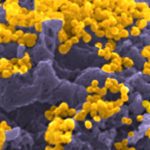Lien vers Pubmed [PMID] – 24172896
Nature 2013 Nov;503(7475):277-80
Neutralizing antibodies can confer immunity to primate lentiviruses by blocking infection in macaque models of AIDS. However, earlier studies of anti-human immunodeficiency virus type 1 (HIV-1) neutralizing antibodies administered to infected individuals or humanized mice reported poor control of virus replication and the rapid emergence of resistant variants. A new generation of anti-HIV-1 monoclonal antibodies, possessing extraordinary potency and breadth of neutralizing activity, has recently been isolated from infected individuals. These neutralizing antibodies target different regions of the HIV-1 envelope glycoprotein including the CD4-binding site, glycans located in the V1/V2, V3 and V4 regions, and the membrane proximal external region of gp41 (refs 9-14). Here we have examined two of the new antibodies, directed to the CD4-binding site and the V3 region (3BNC117 and 10-1074, respectively), for their ability to block infection and suppress viraemia in macaques infected with the R5 tropic simian-human immunodeficiency virus (SHIV)-AD8, which emulates many of the pathogenic and immunogenic properties of HIV-1 during infections of rhesus macaques. Either antibody alone can potently block virus acquisition. When administered individually to recently infected macaques, the 10-1074 antibody caused a rapid decline in virus load to undetectable levels for 4-7 days, followed by virus rebound during which neutralization-resistant variants became detectable. When administered together, a single treatment rapidly suppressed plasma viraemia for 3-5 weeks in some long-term chronically SHIV-infected animals with low CD4(+) T-cell levels. A second cycle of anti-HIV-1 monoclonal antibody therapy, administered to two previously treated animals, successfully controlled virus rebound. These results indicate that immunotherapy or a combination of immunotherapy plus conventional antiretroviral drugs might be useful as a treatment for chronically HIV-1-infected individuals experiencing immune dysfunction.

